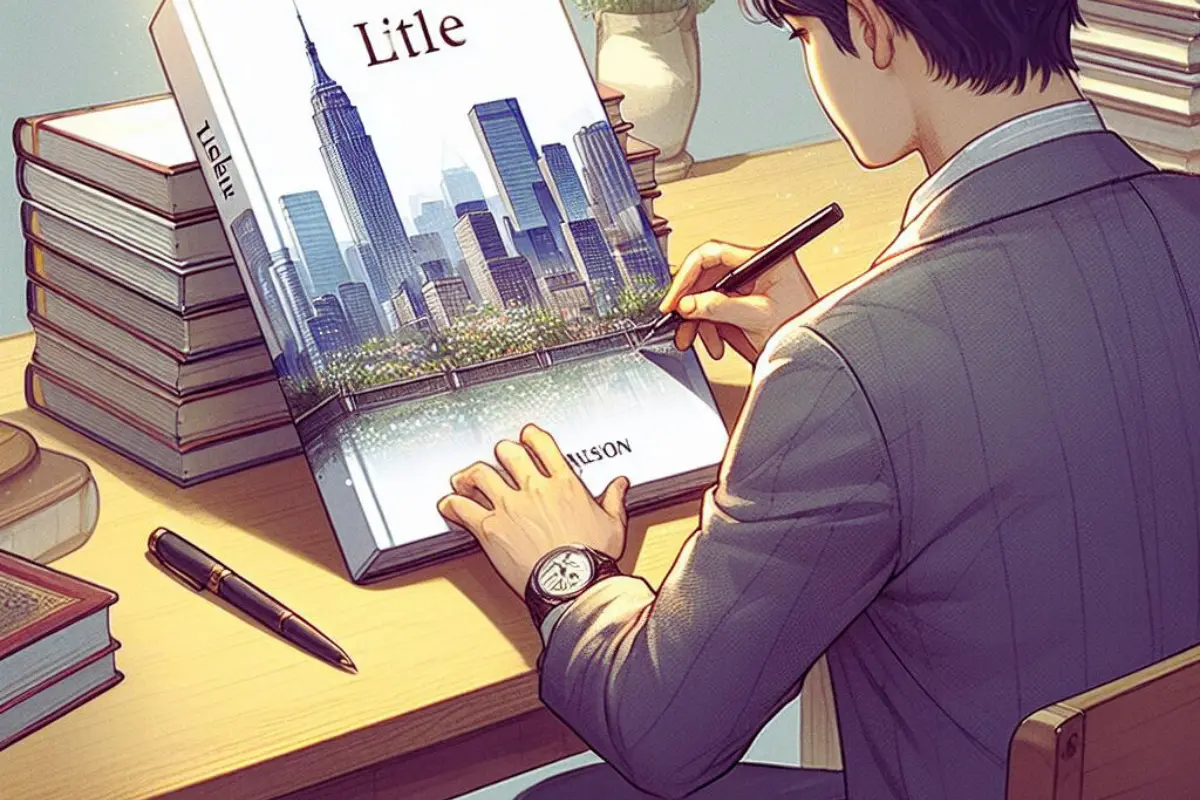How to Write a Novel For Beginners: A Step-by-Step Guide
Read this article to learn how to write a novel for beginners. These step-by-step guides help you to write better novels even though you're a novice.

Zannat Mou
Last updated on Jul 11th, 2024

When you click on affiliate links on QuillMuse.com and make a purchase, you won’t pay a penny more, but we’ll get a small commission—this helps us keep up with publishing valuable content on QuillMuse. Read More.
Table of Contents
Do you want to be a novel writer? Do you want to write a masterpiece novel? Okay, no problem. Now you are in the right place. Already, I have got so many queries on how to write a novel for beginners. Some of the writers are worried about how to write a novel for beginners.
Writing a novel, especially for a beginner, is difficult work. Imagine you are getting letters from your readers to publish your novel. Doesn’t it make you feel excited?
The great news is if you explore this post you do not have to be one of those failed novel writers.
Introduction
Do you want to know what a novel is before you get to know how to write a novel for beginners?
The novel comes from the Italian word “novella”. A novel, meaning “new,” is a story, an extension of literary prose. Unlike a scenario, a novel usually tells an imaginative fictional story that follows a series of events.
Novels create events that are told through characters, plot, dialogue, central plot (including elements such as conflict, climax, and resolution), plot development, and an ending or climax.
Although novels contain these elements at varying stages, they all tell a story through a series of events or incidents that are inspired in some way by the human condition or experience. A novel is a permanent record of a story in the form of a bound book. Most novels also contain between 90,000 and 1,19,000 + words. However, it depends on the genre of the book.
How to Write a Novel For Beginners
Here I am sharing with all of you some beneficial tips that will make you know about how to write a novel for beginners.
1. Finding Your Story’s Quintessence
It’s the first tips on how to write a novel for beginners. Think fundamentally about the kind of story you need to tell your readers. Is it an exciting secret, an endearing romance, or maybe a fantastical experience? Your story could be a way to investigate your claim about individual encounters, societal issues, or inventive worlds. Understand the ‘what’ behind your story – it’ll be the directing light through how to write a novel for beginners.
2. Identify Your Readers
Are you writing this novel for yourself, or are there specific readers you want to read your work? If you think about how to write a novel for beginners you must be careful about identifying your readers.
- Knowing your readers can help you find comfort or evoke an emotion.
- You can create elements that resonate, whether it’s to entertain or simply emotion.
3. Enjoy The Journey
Don’t only think about how to write a novel for beginners. Keep in mind that writing a novel may be a marathon, not a sprint. There will be moments of invigoration and periods of stagnation. Be gentle with yourself, celebrate every milestone, and keep in mind why you started within to begin with.
4. Researching Your Genre
It is an info-graphic of steps on how to write a novel for beginners. Whether you’re looking to write the following extraordinary American novel or just trying to create an unused story, investigating different sorts can be an extraordinary way to get started. But where do you start? Here are many tips for researching fiction writing genres:
- Start writing from your heart
- Making a story from your experience
- Embark yourself in your novel’s story
Related: How to Write a Book About Your Life
5. Develop Your Idea
Every novel begins with an idea—a seed of inspiration that germinates into a full-fledged story. Your idea could stem from a character, a setting, a theme, or even a single intriguing scene. Take the time to brainstorm and explore different concepts until you find one that resonates with you. Once you have your idea, flesh it out by asking yourself questions like:
- What is the central conflict of the story?
- Who are the main characters, and what are their goals?
- Where does the story take place, and why is the setting significant?
6. Reading Novels and Watching Movies as Your Thoughts
This is an extensive tip on how to write a novel for beginners. In case you need to write a novel, it can be helpful to study books and watch movies that are similar to the one you need to write.
This will provide you a better understanding of the genre, what readers or viewers anticipate, and how you’ll be able to put a one-of-a-kind turn on a tried-and-true introduction that others have as of now used.
Additionally, watching movies (or reading novel books) can allow you a feel for what works visually well in a specific genre. Examining the work of others can assist you in creating your claim novel writing style.
7. Making Characters for Your Novel
Trying to make major characters is a significant tip on how to write a novel for beginners. Most incredible stories are character-driven. Making practical characters isn’t close to choosing a title or choosing on their physical attributes. It’s approximately breathing life into them, making them as genuine to your readers as their friends and family.
Let’s get to know about how to make your characters not just exist, but live and breathe in your story. Here are a few things to think around once you are arranging out your fundamental characters:
- Try to make major and minor both characters in your novel.
- It should be human.
- Characters’ past incidents influence the present situation.
- Make it feel realistic
Keep in mind that your primary characters are the vessels through which your readers will explore the world you’ve made. They are the voices that tell your story, the hearts in which your readers discover a connection, and the souls that carry your story.
8. Outline Your Plot
While some writers prefer to dive into writing with little to no planning, outlining can be a valuable tool for organizing your thoughts and keeping your story on track. Your outline doesn’t have to be rigid or overly detailed; think of it as a roadmap that helps you navigate the twists and turns of your narrative. Sketch out the major plot points, including the inciting incident, rising action, climax, and resolution, and allow room for spontaneity and creativity as you write.
9. Set the Scene
The setting of your novel is more than just a backdrop—it’s a living, breathing world that shapes the actions and experiences of your characters. Whether it’s a bustling city, a remote wilderness, or a fantastical realm, vividly describe the sights, sounds, and smells to immerse your readers in the story. Research real-world locations if necessary, or let your imagination run wild to create a setting that feels authentic and compelling.
10. Set a Time for Your Novel Writing
Set a specific time; the other important thing is how to write a novel for beginners.
To complete your first draft, you’ll have to discover a time and place that’s conducive to your writing objectives. You’ll be able to type in at the same time each morning or evening, write in short parts throughout the day, or write in long parts three days a week.
Do not hold up to write as it were once you feel spurts of motivation. Instead, treat writing just like the genuine work it is and adhere to a normal schedule.
Try planning a specific writing time in your everyday calendar. Even if you don’t truly feel like writing at that point, or just can’t get the words to come out, sit down during your planned time and work at it.
Make a piece space to help you get into a schedule. Discover a cozy environment where you’ll be able to focus on your writing novel. Contribute to a chair that won’t cause back pain after a couple of hours of sitting and writing. You will be investing a part of your time in this place, so make it comfy and writing-friendly![1]
Related: How to Become a Book Editor
11. Develop Your Novel Structure
Some of the beginners asked me how to write a novel for beginners. They also asked me about novel structures.
Think of structure as the main part of your novel. It’s the beat that moves your novel story along, ensuring that your readers are continuously enveloped by the proper feeling at the correct time. It’s approximately knowing when to sprint through an activity and when to wind through a gentle scene, permitting readers to capture their breath.
The writing process is frequently compared to a journey, for great reason. Just as a journey has a starting, center, and conclusion, so does a story.
12. Revise and Refine
Once you’ve completed a draft of your novel, it’s time to roll up your sleeves and get down to the nitty-gritty of revision. This is where the real magic happens, as you fine-tune your prose, strengthen your characters, and tighten your plot. Be prepared to cut scenes, rewrite dialogue, and restructure chapters as needed to improve the overall flow and coherence of your story. Don’t be afraid to seek feedback from beta readers or writing peers—they can offer valuable insights and perspectives that will help you see your work with fresh eyes.
13. Polish Your Manuscript
After several rounds of revision, your novel should be taking shape into its final form. Now it’s time to focus on the finer details, such as grammar, punctuation, and sentence structure. Proofread your manuscript carefully, or consider hiring a professional editor to give it a thorough once-over. Remember, the goal is to produce a polished, professional-looking manuscript that will impress literary agents and publishers.
14. Pursue Publication
With your manuscript polished to perfection, it’s time to take the plunge and pursue publication. Research literary agents and publishing houses that specialize in your genre, and craft a compelling query letter and synopsis to entice them. Be prepared for rejection—it’s a rite of passage for every writer—but don’t let it discourage you. Keep honing your craft, exploring new opportunities, and never lose sight of your passion for storytelling.
Conclusion
Writing a novel for beginners is an exhilarating and fulfilling endeavor. By following these twelve steps, you’ll be well-equipped to navigate the ups and downs of the writing process with confidence and resilience. Remember to trust in your creativity, embrace your unique voice, and never stop learning and growing as a writer. With dedication, perseverance, and a healthy dose of imagination, you have the power to craft a novel that captivates readers and leaves a lasting impact on the world. So what are you waiting for? Let’s get writing!
FAQs
Is it essential to maintain timing for a novel writer due to the beginning?
In case beginners ask me how to write a novel for beginners, I suggest that
Time maintenance is very important for those who want to start novel writing because you are a beginner. If you are not careful about time maintenance from the beginning then you will not be able to progress in novel writing. You have to maintain the time in such a way that you can complete each part of the novel on time.
What is the general length of the novel for beginners?
There is no specific rule on how to write a novel for beginners. It’s not mandatory
how many words you should write in your novel. Especially as a beginner, you can write a novel of 70,000 to 90,000 words. If you want you can write more.
How we've reviewed this article
Our content is thoroughly researched and fact-checked using reputable sources. While we aim for precision, we encourage independent verification for complete confidence.
We keep our articles up-to-date regularly to ensure accuracy and relevance as new information becomes available.
- Current Version
- Jul 11th, 2024
- Dec 26th, 2023



